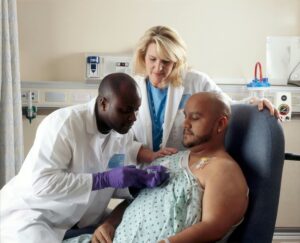The Life of an Emergency Room Doctor: A High-Stakes Career Saving Lives


Emergency room (ER) doctors work in a fast-paced environment where every second counts. Their job demands quick thinking, exceptional medical expertise, and the ability to stay calm under pressure. As the first line of defense in critical situations, ER doctors must diagnose and treat patients efficiently, often with limited information. The emergency room is a chaotic yet vital part of the healthcare system, requiring skilled professionals who can handle life-or-death scenarios daily.
The Role and Responsibilities of an ER Doctor
An emergency room doctor is responsible for assessing, diagnosing, and treating patients with urgent medical conditions. Unlike specialists who focus on a single field of medicine, ER doctors must be well-versed in a broad range of medical disciplines. From heart attacks and strokes to broken bones and infections, they encounter a wide variety of cases each day.
In addition to treating patients, ER doctors must collaborate with nurses, technicians, and specialists to ensure the best possible outcomes. They also make crucial decisions about patient care, such as whether a patient should be admitted to the hospital, referred to a specialist, or discharged with at-home treatment. Their ability to quickly evaluate and respond to medical emergencies often determines whether a patient survives.
A Typical Day in the Emergency Room
No two days in the emergency room are the same. Each shift brings new challenges, requiring ER doctors to adapt to constantly changing situations. At the start of a shift, doctors review patient charts, coordinate with hospital staff, and prepare for any incoming emergencies.
As patients arrive, ER doctors assess their conditions based on urgency. Critical cases, such as trauma victims or those experiencing cardiac arrest, take priority. Doctors juggle multiple cases simultaneously throughout the day, making split-second decisions while ensuring every patient receives proper care. By the end of their shift, they may have treated dozens of patients, each with a unique medical issue.
Skills and Qualities Required for Success
Becoming an ER doctor requires more than just medical knowledge. Strong problem-solving skills are essential, as doctors must diagnose patients quickly and accurately. Additionally, remaining calm in high-pressure situations is crucial, as panic can lead to mistakes.
Communication is another key skill for ER doctors. They must effectively explain complex medical conditions to patients and their families while working closely with hospital staff. Furthermore, stamina and resilience are necessary, as long shifts and emotional challenges can be physically and mentally demanding.
Challenges Faced in the Emergency Room
One of the biggest challenges ER doctors face is the unpredictability of their work. They never know what cases will come through the doors, so they must be prepared for anything. This uncertainty, combined with the high stakes of emergency medicine, can lead to significant stress and burnout.
Additionally, ER doctors often deal with complex patients or family members who are anxious, in pain, or frustrated. Managing these interactions with empathy and professionalism is essential. Despite these challenges, many ER doctors find their work incredibly rewarding, knowing their quick actions can save lives.
Education and Training Pathway
Becoming an ER doctor requires years of rigorous education and training. The journey begins with earning a bachelor’s degree, typically in a science-related field. Afterward, aspiring doctors must complete medical school, which takes another four years.
Following medical school, a residency program in emergency medicine is required. This hands-on training lasts three to four years and provides experience in treating various medical emergencies. Some doctors pursue additional fellowship training in specialized areas such as trauma, toxicology, or pediatric emergency medicine. Once their training is complete, they must pass board certification exams to practice as an ER doctor.
The Impact of ER Doctors on Patient Outcomes
ER doctors are crucial in determining a patient’s chances of recovery. Their ability to quickly diagnose and treat conditions like strokes, heart attacks, and severe injuries can mean the difference between life and death. Because of their rapid decision-making, they often prevent complications that could have long-term effects on a patient’s health.
Beyond immediate treatment, ER doctors also educate patients about follow-up care and preventive measures. By offering guidance on lifestyle changes or medication management, they help reduce the likelihood of future emergencies. Their work extends beyond the hospital, shaping the overall well-being of the communities they serve.
Coping with the Emotional Toll
The emotional demands of being an ER doctor are immense. Seeing patients in distress, delivering bad news, and dealing with loss can take a significant toll. Over time, this emotional burden can lead to compassion fatigue or burnout if not correctly managed.
To cope, many ER doctors rely on strong support systems, including colleagues, friends, and family. Some also engage in stress-relieving activities such as exercise, meditation, or hobbies outside of work. Hospitals and medical institutions increasingly recognize the importance of mental health support for healthcare providers, offering counseling services and wellness programs.
Advancements in Emergency Medicine
Emergency medicine has evolved significantly over the years, with advancements improving patient care and survival rates. Modern technology, such as portable ultrasound machines and artificial intelligence-driven diagnostics, allows ER doctors to make faster and more accurate assessments.
Additionally, telemedicine has transformed emergency care, enabling doctors to consult with specialists remotely in critical cases. This innovation is particularly beneficial in rural or under-resourced hospitals, where immediate access to certain specialists may be limited. As medical technology continues to progress, ER doctors will have even more tools at their disposal to save lives.
Emergency room doctors are the backbone of the healthcare system, providing critical care when it matters most. Their expertise, quick thinking, and dedication significantly impact patient outcomes and public health. Despite the challenges, many ER doctors are deeply passionate about their work, finding fulfillment in helping others during their most vulnerable moments. While the job is demanding, it remains one of the most essential and rewarding medical careers.
